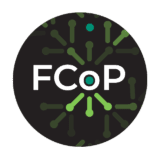Overview
Research and reflection was an important part of the FCoP mission: a way to observe practices, synthesize observations, and understand the current state of the field.
Dr. Amelia Acker joined the project team as a resident researcher. Amelia visited FCoP cohort project sites to observe how software preservation practices are applied in different stewardship contexts and cultural heritage organizations, interviewing team members and observing software preservation in practice.
Amelia’s research is presented below, along with a suite of teaching modules for use by digital preservation educators and interested communities of practice.
Research
There is a robust research literature on digital preservation of information objects in cultural heritage institutions, but software preservation supported with emulation techniques is still relatively new to library and information science.
Emulation practices are well-known, however, amongst die-hard video game fans, music producers, research data managers, and preservation practitioners who care for and access software-dependent information. But emulation as a category of information practice is largely unknown to the broader research communities concerned with information systems that support access, research infrastructures, and preserving knowledge through time. Also little-examined are the situated work of software preservationists as they manage tasks, implement programs, and coordinate activities within their institutions.
Here you can find an emulation white paper intended for information professionals, institutional administrators, and funders; an empirical study of preservationists implementing emulation programs, and the research instruments for data collection related to the project. This research begins to address these gaps in knowledge about emulation practices, examining the range of emulation practices in libraries, archives, and museums, and calling into question software emulation as a single, static preservation strategy for cultural heritage institutions.
Report from 2019 Summer Fieldwork
If you are an information professional currently involved in implementing or planning software preservation programs and want to learn more about implementing emulation services, check out the report from this fieldwork, “Emulation Practices in Place: Coordinating Software Preservation in Libraries, Archives, and Museums.” This report is also intended for administrators managing institutions that provide preservation services, and program officers from funding organizations both public and private, that currently addresses capacity building in digital cultural preservation and technology access initiatives.
ASIS&T Conference Proceedings Paper
If you’re interested in the scholarly study of emulation in digital preservation workflows or learning more about the FCOP cohort as a community of practice, you can read the ASIS&T conference proceedings paper “Emulation Encounters: Software Preservation in Libraries, Archives, And Museums,” that will be published in the Proceedings of the 83rd Annual Meeting of the Association for Information Science & Technology | October 24-28, 2020, forthcoming.
Research Instruments
The research instruments, including descriptions of data collected from this research can be found at the project’s dataverse in the Texas Data Repository: Acker, Amelia, 2020, “Fostering Communities of Practice: Software Preservation and Emulation in Libraries, Archives and Museums”, https://doi.org/10.18738/T8/U4ZJIJ, Texas Data Repository Dataverse, V2
Teaching Resources
This set of open educational resources (OER) was designed to serve as discussion handouts for use by educators training information professionals. The overall learning objectives are to introduce early graduate students to preservation contexts where software emulation would occur, and how it is accomplished. The resources draw upon emulation projects observed by Amelia, reported by FCOP cohort participants, and cases used in the IDCC workshop from February 2020.
Access the open educational resources »
Field Reports

Field Report #5: University of Virginia
University of Virginia: Keeping Software Present with Emulation in the Archives It’s been a few months since my last fieldwork visit for the FCoP project! In August, I was hosted by cohort team member Lauren Work at the UVA Library. …Continue Field Report #5: University of Virginia
Field Reports, News

Field Report #4: GeorgiaTech retroTECH
Second Site Visit: GeorgiaTech Hi y’all, In July I visited the Georgia Tech Library’s Retrocomputing Lab also known as retroTECH! Located in the Special Collections and Archives unit, this lab’s mission is focused on supporting the Georgia Tech campus community in …Continue Field Report #4: GeorgiaTech retroTECH
Field Reports, News

Field Report #3: Living Computers: Museum + Labs
First Site Visit: LCM+L Two weeks ago I visited the Living Computers: Museum + Labs in Seattle, Washington. LCM+L is a computing technology museum that features an impressive collection of early working computers from the late twentieth century, including a super computer, …Continue Field Report #3: Living Computers: Museum + Labs
Field Reports, News

Field Report #2: Methods, preparation, and tools
Hello friends In preparation for my first field site visit next week for the FCoP project I’m gathering supplies, resources, and tips for the next few months of visits and synthesis. For this research project, I’m going to try a …Continue Field Report #2: Methods, preparation, and tools
Field Reports, News

Field Report #1: IRB Approval and Planning Site Visits
Hi Y’all Today I am excited to share with you my first field report as the designated FCoP researcher with updates about kicking off fieldwork this summer. Before I jump into some updates about my research fieldwork, I wanted to describe what …Continue Field Report #1: IRB Approval and Planning Site Visits
Field Reports, News

Field Report: Introducing Dr. Amelia Acker
About Dr. Acker Amelia Acker (PhD, University of California, Los Angeles) is an assistant professor in the iSchool at the University of Texas at Austin. Her research interests focus on the emergence, standardization, and preservation of new forms of data …Continue Field Report: Introducing Dr. Amelia Acker
Field Reports, News
About Amelia
Amelia Acker is an assistant professor in the School of Information at the University of Texas at Austin where she also serves as the director of the Critical Data Studies Lab. Amelia teaches courses in information science, metadata, digital preservation and data studies. She is currently researching platform development, software emulation, preservation infrastructures and data archives. Before joining UT, Amelia worked as an archivist and librarian in Los Angeles, California. For more information about her research and teaching, visit: http://www.ameliaacker.com/.